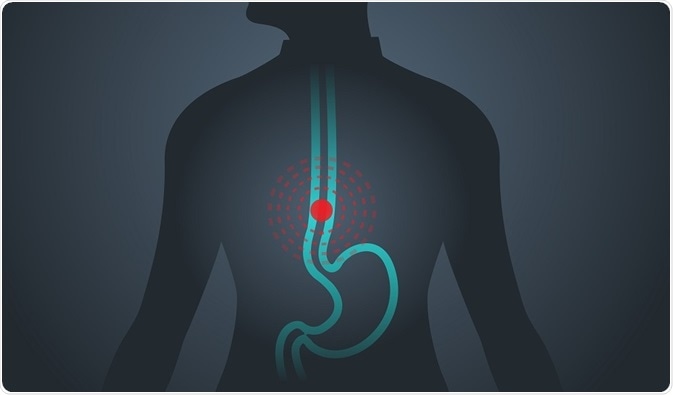The esophagus is the pipe that connects the oral cavity (mouth) to the stomach. Cancer of the esophagus is associated with various symptoms, the most common of which is dysphagia.

iLoveCoffeeDesign | Shutterstock
Esophageal cancer is uncommon, but not rare. It is the seventh most common cancer worldwide.
Symptoms of esophageal cancer
Dysphagia
The main symptom of esophageal cancer is dysphagia, which means difficulty swallowing. This occurs due to the tumor restricting the esophagus. When swallowing one may feel like the food gets stuck within the throat. This is because the muscles of the esophagus must work hard in order to push the food past the tumor.
As a consequence, one may feel the need to chew longer, so as to make the pieces of food smaller, thereby allowing them to travel down the gullet easier. Patients may also experience a burning sensation when trying to swallow food. Eventually, dysphagia occurs not only with swallowing solid foods, but liquids as well.
Other common symptoms of esophageal cancer include:
- Regurgitation of food and vomiting.
- Since the esophagus lies in the chest, the cancer may mimic heart or lung disease with the clinical presentation of chest pain.
- Frequent choking on food caused by dysphagia.
- Pain while swallowing - called odynophagia.
- Heart burn and acid reflux.
- Vomiting, which can occasionally be bloody.
- Hoarseness of the voice, and cough that refuses to go away within 2 weeks.
- Throat pain and discomfort.
- Progressive weight loss and fatigue due to the inability to eat.
Do these symptoms always indicate esophageal cancer?
Many of the symptoms outlined above are characteristic of much less serious problems, such as indigestion. Persons with persistent symptoms, however, should be seen by a doctor so that the cause of the symptoms may be determined.
When do patients become symptomatic?
Early esophageal cancer is often asymptomatic, contributing to a late diagnosis in many. This is unfortunate because esophageal cancer in its earliest stages is easier to treat.
Symptoms appear as the tumor grows and obstructs the esophagus. It is only when the tumor has grown large enough to narrow the esophagus by about half its normal width that the main symptom – of difficulty swallowing – will occur.
What are the risk factors for developing esophageal cancer?
The etiology of esophageal cancer has not been fully studied. However, there are several factors, mostly due to lifestyle choices, that seem to play a role in disease pathogenesis.
Smoking and heavy usage of alcohol are believed to be implicated in increasing the risk of developing esophageal cancer, and this is believed to be due to the damage that these activities cause to the cells lining the esophagus. In addition to these, hot beverages and poor diet may also be implicated.
While the stomach is built to withstand the acid that it produces, the esophagus is not. As a consequence, patients who experience esophageal irritation due to frequent heartburns are at a high risk of developing abnormal changes in esophageal cells.
Over time, these changes may lead to cancer. Aside from lifestyle and health disorders, age, race, and sex appear to play a role. Older people, men, Caucasians, and obese persons seem to be at a higher risk of developing the condition.
Further Reading
Last Updated: Jun 12, 2023